The Petro government is making moves to buy Monómeros: How beneficial would the acquisition be for the country?

The most recent meeting between the Minister of Mines and Energy, Edwin Palma, and Venezuelan President Nicolás Maduro opened the door to advancing energy issues and discussing the possible purchase of the Venezuelan state-owned company Monómeros, located in Barranquilla.
Monómeros, which currently accounts for nearly 30 percent of fertilizer production in the country and supplies 80 percent of the Colombian peasantry , was created in 1967 by the Venezuelan Institute of Petrochemicals and the Colombian companies Ecopetrol and the defunct Ifi (Institute for Industrial Development), with subsequent support from the Dutch firm Stamicarbon.
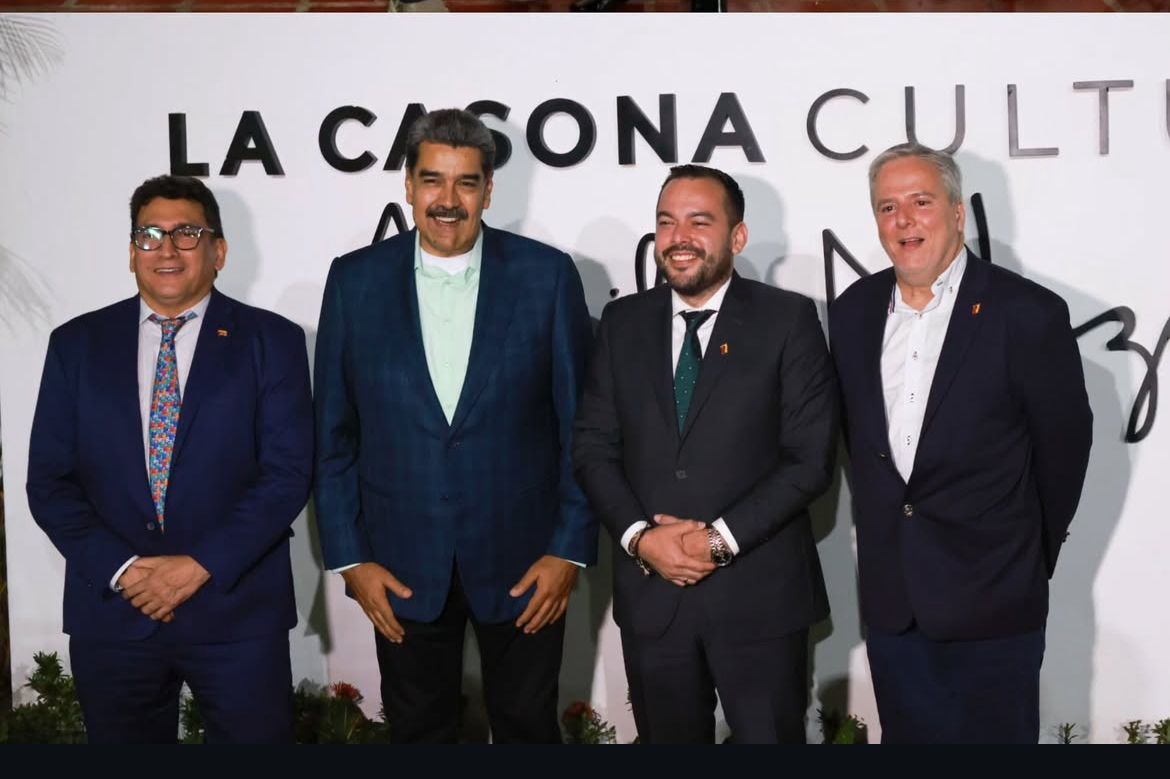
Official visit to Venezuela by the Minister of Mines and Energy, Edwin Palma. Photo: Minenergía
In 2006, the Colombian government—then under President Álvaro Uribe Vélez—sold all its shares in Monómeros to Petroquímica de Venezuela (Pequiven), as it did not consider the company part of a business strategy. Today, 19 years later, Monómeros is once again in the spotlight, but this time, the Colombian government is reportedly interested in having absolute control of the company.
What Minister Palma and Ecopetrol President Ricardo Roa are proposing today is to acquire Monómeros in order to diversify the company's portfolio and produce fertilizer inputs.
“By blocking Monómeros and bankrupting it, we're screwing Colombian agriculture and, obviously, the people, because food prices are rising. The Colombian oligarchy isn't worried about people dying of hunger, because that's how they achieve electoral victories by buying votes. We want to make Colombia a country that produces its own food and also exports it. That requires cheap fertilizers for our farmers,” Palma asserted in a tweet on July 4.
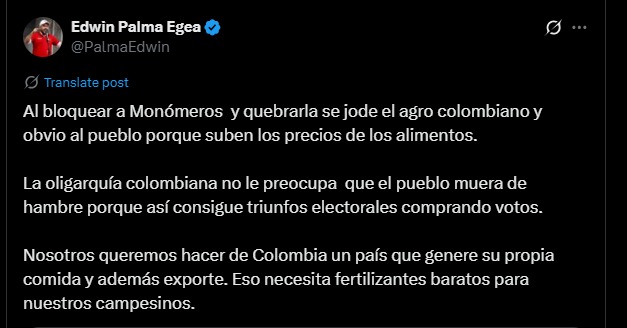
This was Minister Edwin Palma's tweet about Monómeros. Photo: X Edwin Palma
Experts consulted by this newspaper pointed out that the only difference between what Uribe's government thought and what Petro's government thinks today is twofold: first, political will; and second, the possibility that Monómeros could end up losing its business clout as a result of being unable to operate due to the lack of a license from the Office of Foreign Assets Control (OFAC), which has not yet been renewed.
Industry promotion and US sanctions However, some sectors have expressed doubts about whether this purchase would bring benefits to the country. EL TIEMPO spoke with experts on the subject, who pointed out that Colombia's acquisition would be a strategic move to guarantee the independence of the petrochemical industry and essential agricultural products, such as urea and other fertilizers.
"Colombia is in a privileged position to manage the company. The fact that Venezuela, which is at risk of further sanctions , would sell it to private and foreign hands is a situation Colombia must avoid if it wants to ensure the growth of its industry," said Walter Arévalo, professor of international law at the Universidad del Rosario.
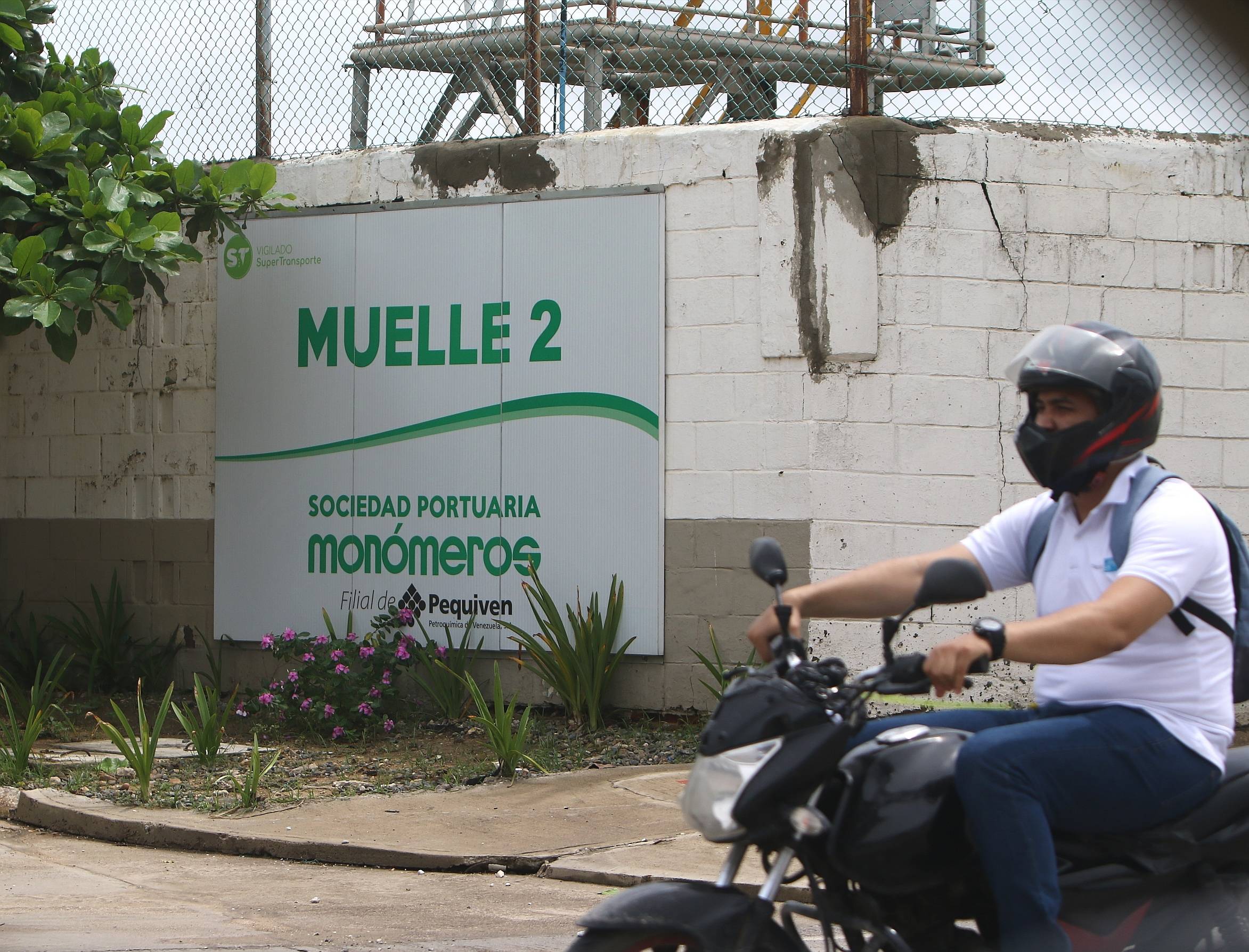
Monomeros plant in the city of Barranquilla. Photo: Kronos Agency Photo: Kronos Agency
For Milton Montoya, director of the Department of Mining and Energy Law at Externado University, what the government is proposing regarding the guarantee of fair prices for fertilizers would not occur automatically with the purchase.
"It would require a subsidy program that could be offered if the government controlled the company from a managerial and executive perspective. The Colombian state, having complete control over Monómeros, could offer a fertilizer subsidy scheme to farmers. The underlying question is: where will the resources come from to fund this subsidy fund for purchasing fertilizers at below-market prices or offering below-market prices?" Montoya said.
Analysts believe the political closeness between the Petro administration and that of Nicolás Maduro should be leveraged , allowing negotiations to be carried out in a favorable and friendly manner for Colombia.
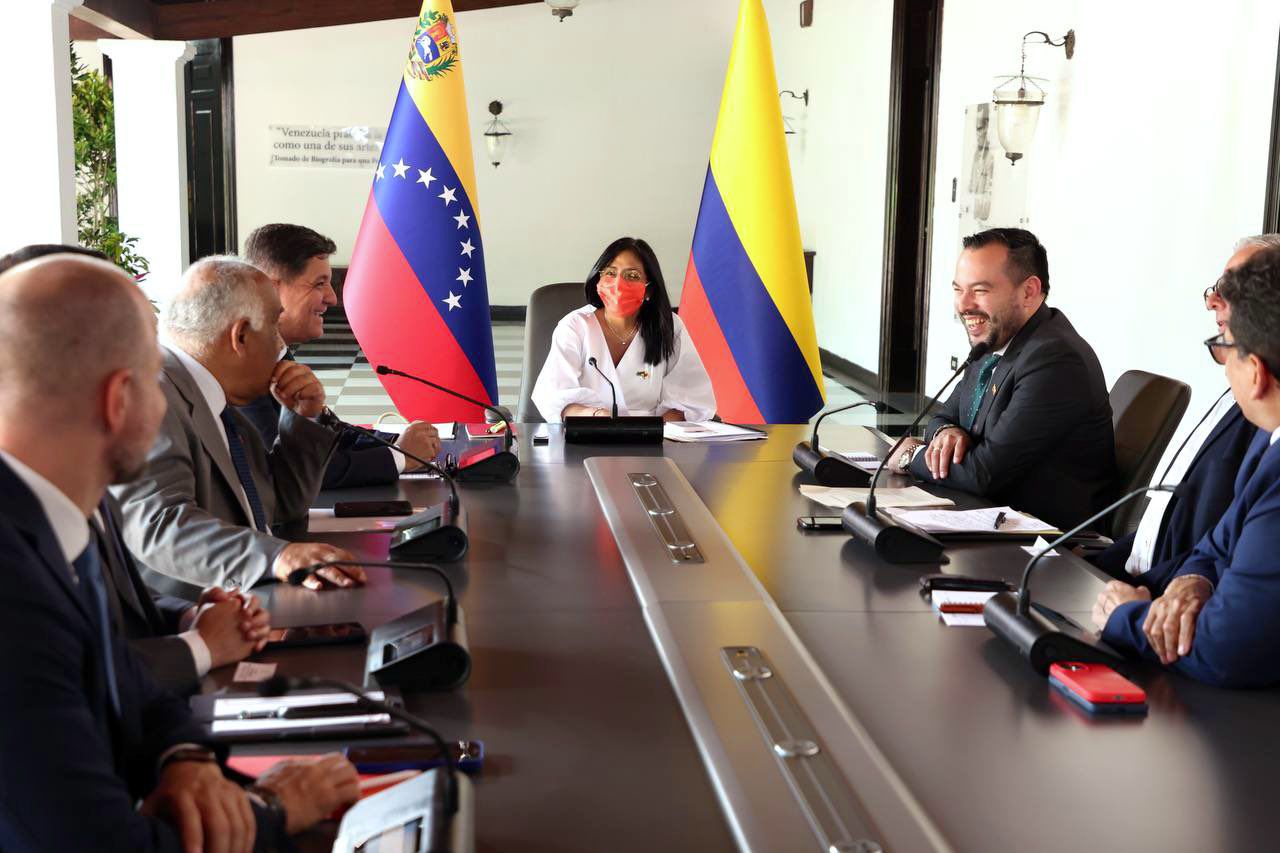
Official visit to Venezuela by the Minister of Mines and Energy, Edwin Palma. Photo: Minenergía
Along the same lines, former CNE president and Monómeros official César Lorduy welcomes Colombia's purchase of Monómeros, as it would allow the company to operate without blockades. The former judge is referring to the pending licensing by the Office of Foreign Assets Control (OFAC) of the Trump administration, which currently prevents the company from conducting international negotiations.
The question then arises: if Colombia buys Monómeros, could it recover that license? Speaking to EL TIEMPO, Lorduy assured that it would be possible, because: “ Monómeros is not directly blocked. It is indirectly blocked, since it is really PDVSA that is blocked. PDVSA , in turn, owns Pequiven, and Pequiven owns Monómeros. That is the reason why Monómeros is subject to the OFAC blockade.”
He also noted that Monómeros is a Colombian company, incorporated and established with headquarters in the country, but with Venezuelan shareholders.
" Monómeros deserves to be a company that operates without any kind of blockage. But, more than that, as a national and state-owned company, the advantage I would see is that the State can invest in it, through loans, that will allow it to return to its glory days," he said.
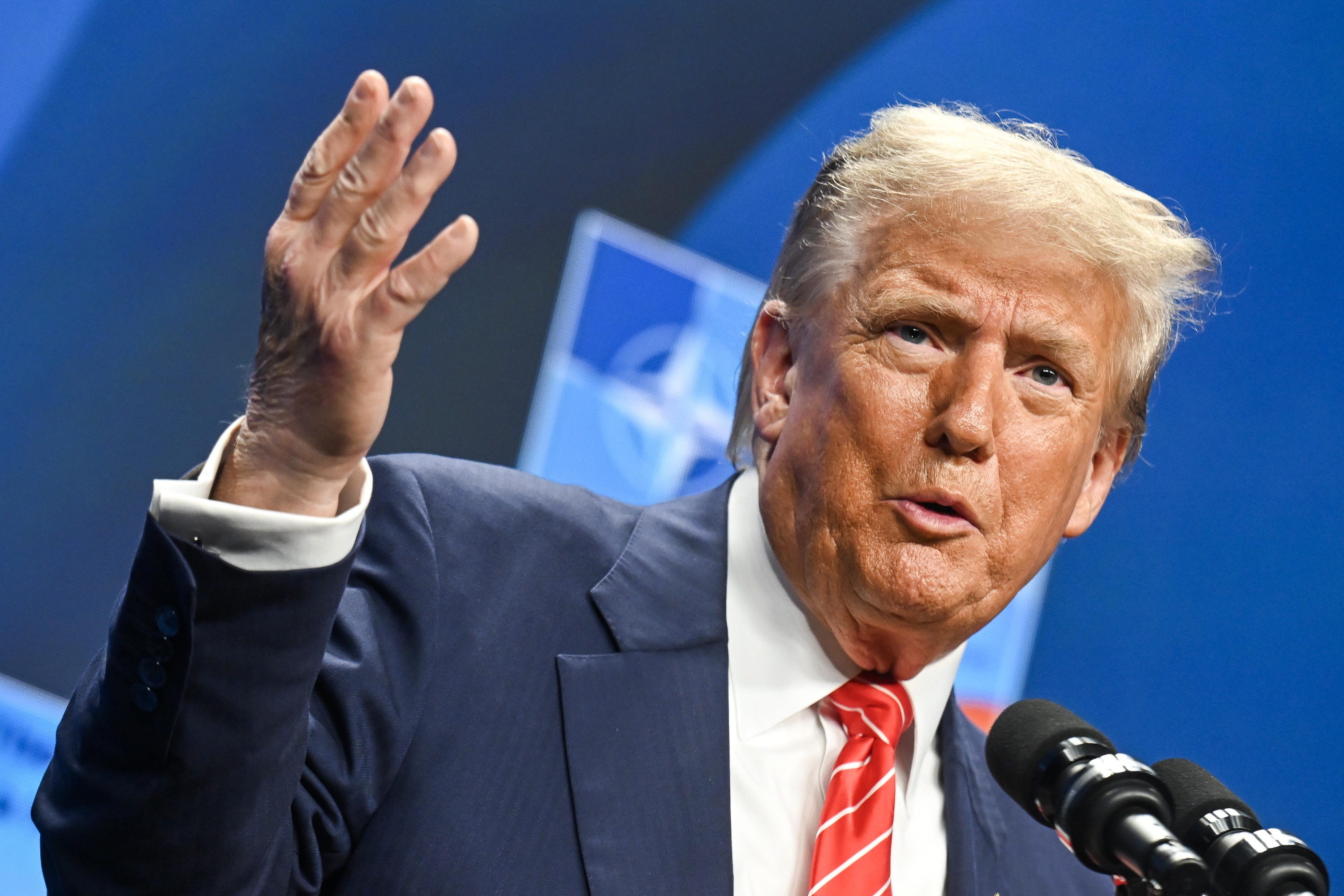
The Trump administration's Office of Foreign Assets Control has not granted the license. Photo: EFE
While some welcome the purchase, others disagree, such as former Justice Minister Wilson Ruiz, who tweeted a few days ago: " Monómeros is not Colombian. It's a bankrupt, looted, and sanctioned Venezuelan company. But @petrogustavo wants Colombia to buy it with public funds. Why? To transfer money to the Chavista regime, disguise the disaster with patriotism, and stay in Maduro's good graces. Petro is unbridled and determined to lead Colombia toward 21st-century communism."
Former Minister of Agriculture Juan Camilo Restrepo joined the opposing voices: " The schemes the Minister of Mines is making in Caracas to buy Monómeros from Maduro are as improvised and poorly thought out as the passport novel, or the story of bringing gas from Venezuela through a completely useless pipeline. Ideologically driven news stories about bad deals that go nowhere make headlines, but nothing more."
The point that remains in doubt is that, as Roa suggests, Colombia would purchase monomers to produce compounds such as urea, which would require raw materials such as ammonia and natural gas , inputs that are currently in serious short supply in the country.
Maria Alejandra Gonzalez Duarte
eltiempo





